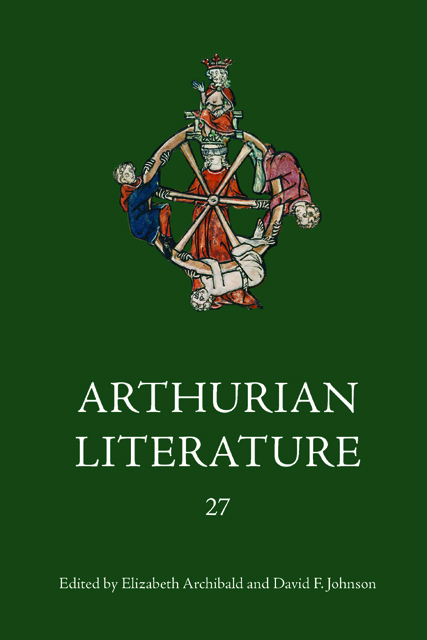Book contents
- Frontmatter
- Contents
- General Editors’ Foreword
- List of contributors
- I Commemoration in La Mort le roi Artu
- II ‘… “if indeed I go”’: Arthur’s Uncertain End in Malory and Tennyson
- III The Intruder at the Feast: Negotiating Boundaries in Medieval Insular Romance
- IV What Women Really Want: The Genesis of Chaucer’s Wife of Bath’s Tale
- V Monstrous Appetite and Belly Laughs: A Reconsideration of the Humour in The Weddyng of Syr Gawen and Dame Ragnell
- VI Speaking (of) Treason in Malory’s Morte Darthur
- VII Lancelot of the Laik: A Scottish Mirror for Princes
- VIII Prince Arthur’s Archers: Innovative Nostalgia in Early Modern Popular Chivalry
- Miscellaneous Endmatter
V - Monstrous Appetite and Belly Laughs: A Reconsideration of the Humour in The Weddyng of Syr Gawen and Dame Ragnell
Published online by Cambridge University Press: 18 February 2023
- Frontmatter
- Contents
- General Editors’ Foreword
- List of contributors
- I Commemoration in La Mort le roi Artu
- II ‘… “if indeed I go”’: Arthur’s Uncertain End in Malory and Tennyson
- III The Intruder at the Feast: Negotiating Boundaries in Medieval Insular Romance
- IV What Women Really Want: The Genesis of Chaucer’s Wife of Bath’s Tale
- V Monstrous Appetite and Belly Laughs: A Reconsideration of the Humour in The Weddyng of Syr Gawen and Dame Ragnell
- VI Speaking (of) Treason in Malory’s Morte Darthur
- VII Lancelot of the Laik: A Scottish Mirror for Princes
- VIII Prince Arthur’s Archers: Innovative Nostalgia in Early Modern Popular Chivalry
- Miscellaneous Endmatter
Summary
The Weddyng of Syr Gawen and Dame Ragnell, hereafter Dame Ragnell, dates from around the middle of the fifteenth century and is a text that excites divided opinion among eminent Arthurian scholars, especially in relation to its comedy. Stephen H. A. Shepherd, himself a supporter of the Dame Ragnell poet's comedic abilities, provides an overview of this ambivalence; P. J. C. Field describes the verse as doggerel yet notes that its rhythms have a cheerful effect, while Donald B. Sands classifies the poem as a burlesque with deliberate humorous effects that is, nonetheless, the product of an indifferent artist. A more recent contribution to this debate is that of Rebecca A. Davis, who views the author as ‘a mischievous poet’ who works with ‘motifs of exaggeration and deliberate ineptitude’. Shepherd detects some agreement between critics that the poem is interesting, ‘perhaps not the least reason for which is that it is an analogue to the Wife of Bath's Tale or that it shows some interesting connections with Malory’, although not all are convinced by Field's argument that Sir Thomas Malory is the author of Dame Ragnell.
The eponymous heroine of Dame Ragnell is a relative of the ‘loathly lady’, the literary type of the old hag who transforms into a young and beautiful woman when given sovereignty over the knight for whom an encounter with her proves educative. Her antecedents in early Irish literature have been well established. The continued appeal of the ‘loathly lady’ during the later medieval period and beyond is evinced by her appearance in Chaucer's Wife of Bath's Tale, Gower's Tale of Florent from the Confessio Amantis, the mid-sixteenth-century ballad The Marriage of Sir Gawain and the later Sir Henry. Since G. H. Maynadier's study of 1901, critics have examined the close textual links between Dame Ragnell, Chaucer and Gower, whose many correspondences have caused Davis to observe of Dame Ragnell:
It is clear that the poet had prior traditions and texts in mind when he composed. He did not merely lift elements from his sources, but adapted the material to his own purposes, shaping familiar material into some form of parody.
- Type
- Chapter
- Information
- Arthurian Literature XXVII , pp. 87 - 102Publisher: Boydell & BrewerPrint publication year: 2010
- 1
- Cited by

